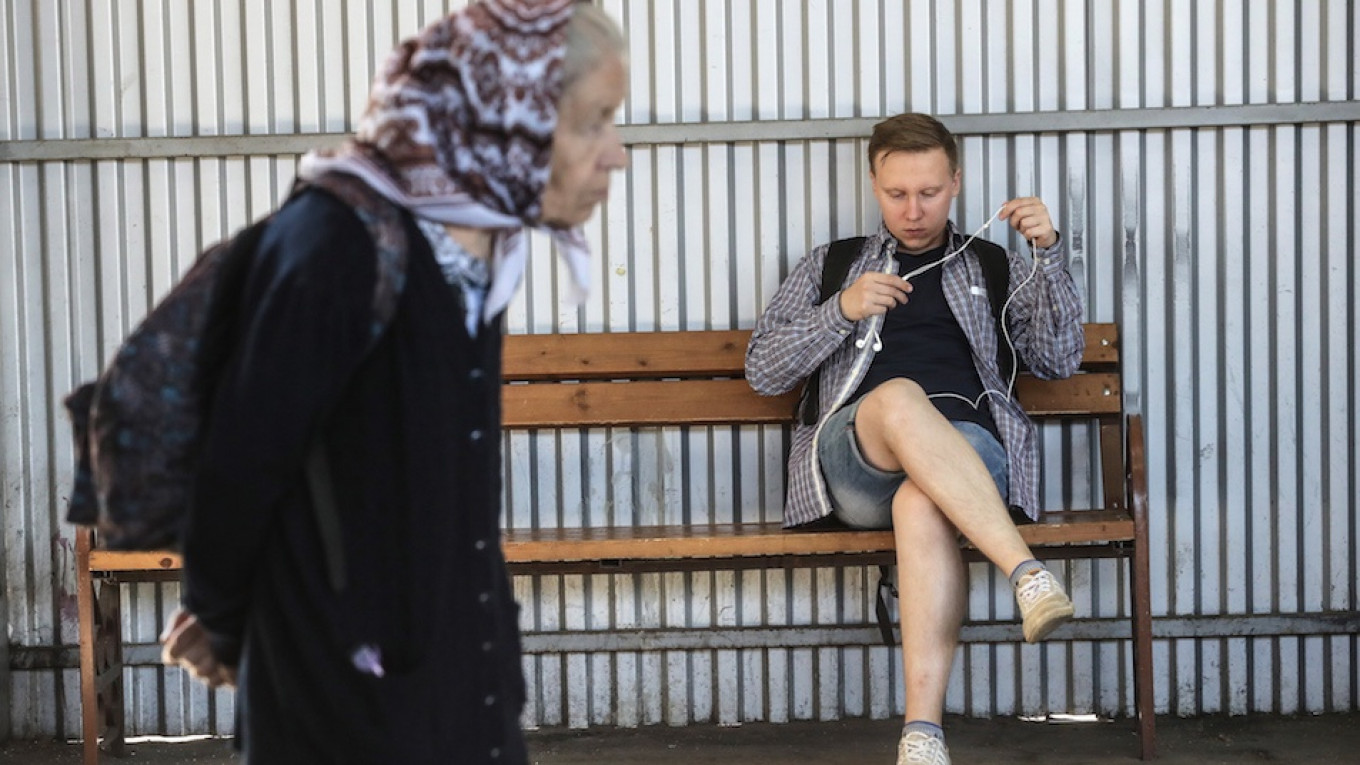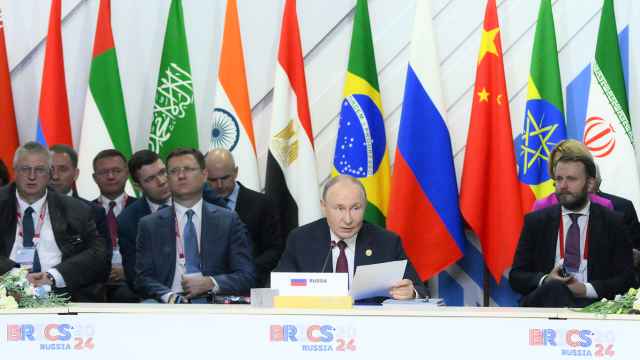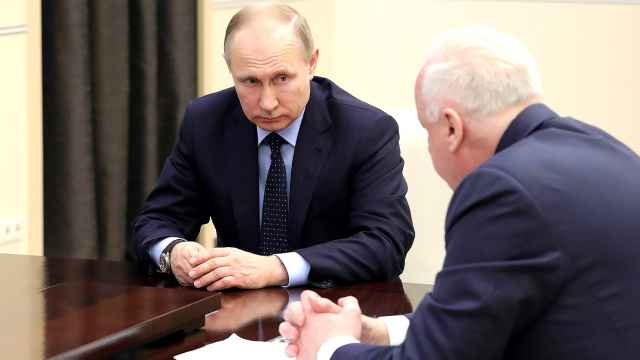The public vehemently and almost universally opposes the Russian government's proposal to raise the pension age from 60 to 65 for men and from 66 to 63 for women, recent polling shows. The independent Levada Center pollster has found that 89 percent of Russians have a negative view of the plan, while no more than 8 percent approved. This is an unprecedented degree of dissent.
The language that focus-group participants used to describe the pension reform plan, as it currently stands, reflected despair. Many respondents felt that change was inevitable, yet they were not quite prepared for it. People admitted that there is no money in state coffers but attributed that to the costs of the 2014 Winter Olympics, the 2018 World Cup and Russia’s ongoing intervention in Syria. Respondents complained about Russia being “too engrossed in defense and military operations in recent years,” being “saddled with Crimea,” and having to rebuild war-torn Syria.
Respondents said that the authorities had unfairly chosen the quickest fix for the problem: “Government officials won’t part with their mansions or yachts, so they’re forced to get bits and pieces from ordinary people.” The focus group participants said that the government had found a way to “milk the people” and “patch up holes with our money” instead of taking difficult yet meaningful steps. Respondents believe that the government is only pretending to combat corruption.
The announcement of the pension reform plan exacerbated fear of and anger toward the state. “Our government can rip us off at any moment,” respondents said, adding, “They lie to us all the time.”
“We have no trust [in the state]. How many times have we seen everything collapse right before our eyes?”
Indeed, the public increasingly believes that the government’s aim is to implement another “scheme to take away people’s money.”
The belief that reforms always end up hurting the people emerged during the 1990s. But recently, people are again speaking in similar tones about the pension reform plan. “They are cheating at a card game, and you have no idea what cards they have, ” one respondent said. Others described Prime Minister Dmitry Medvedev’s government with phrases that would not have been out of place during Boris Yeltsin’s presidency: “The government forgot that it was elected by the people.”
Respondents said the state was the beneficiary of the pension reform plan. Even the initiative’s supporters conceded that “the state needs to make up for its budget deficit” and “balance out the numbers.” In short, they said: “It’s good for the budget.” They blamed Medvedev and Accounts Chamber head and liberal economist Alexei Kudrin for engineering the initiative, yet held the entire cabinet as well as United Russia responsible, too.
President Vladimir Putin’s relative silence has not gone unnoticed. Respondents agreed that he was observing the situation and planning his next move. But opinions differed on his role in developing the pension reform plan.
Some defended Putin saying the initiative had not come from him. The majority believed that despite Putin’s disengagement, “he knows everything.” Some called the whole affair a gimmick intended to make the president look like a good tsar and a savior. Those already disillusioned with Putin attributed his silence to the fact that because it is his ostensibly final term as president, “he doesn’t give a damn about anything.” Still, most people hoped that Putin would intervene and soften the proposed measures.
Focus group participants feared that many Russians, especially men, may simply die before reaching the retirement age: “Our entire population is sick,” “people don’t make it to the age of 60” and “we will be dropping dead like flies.” Participants in every group had relatives who had passed away before turning 60.
Each focus group included people who feared losing work in old age and, as a result of the pension reform plan, ending up unemployed and without financial assistance from the state.
Age discrimination was widely cited and was said to rear its head well before the retirement age. Respondents complained that “once you’re old enough, you’re out” and said that “45 is like a court sentence.”
Once Russians reach this age, they start feeling vulnerable. They can be fired but cannot find new employment: “You want to work, but they don’t let you,” respondents said, adding that the Russian government provided inadequate protections against age discrimination, especially compared to Western governments.
Apart from the changes themselves, respondents were irked by the manner in which they were introduced.
Russians were presented with a fait accompli that, worse still, came less than three months after a presidential election in which Putin gave no hint of a plan to raise the retirement age. People actually expected the president to increase pensions and the standard of living. The less wealthy, who rely on their pensions for subsistence, felt deceived and now nurse grudges.
Meanwhile, the decision to announce the pension reform plan on the opening day of the 2018 World Cup struck respondents as an attempt to “push through” an unpopular decision “undercover” or “under the radar” which they saw as a sign of “disrespect for one’s own people.”
Yet about 7–8 percent of Russians support the pension reform plan. Polling suggests that those who feel confident about the future and who do not depend on state support are more likely to support the initiative. In the focus groups, these were the entrepreneurs and self-employed individuals who do not plan on retiring anytime soon, if at all. The initiative’s supporters feel more stable and more comfortable than the their countrymen. They see themselves as mere observers in the whole affair and are prepared to “stock up on popcorn and watch.” They will not be the subjects of this “experiment.”
As for how people may respond to the pension reform plan, respondents listed a few possible scenarios: toleration, adaptation, quiet resistance and protest — strategies that are not necessarily mutually exclusive and could be combined. Some respondents expressed the idea that “the Russian people will bear it to the end” and will “just swallow the reform.” According to this scenario, few actively protest, while the majority of Russians tighten their belts. But the “quiet resistance” scenario garnered significant support among respondents, who expected people to “look for loopholes,” evade taxes, work off the books and deliberately decrease their productivity.
Another even likelier scenario involves various forms of lawful protest, ranging from writing letters to government agencies to signing online petitions to holding protests. Respondents believed that those nearing the retirement age were the likeliest to participate in protests because the initiative will hit them the hardest, while the young were said to be the second likeliest group to protest in light of their regular participation in recent protests.
Yet few people believe that the pension reform plan can be completely scrapped, and so protesters will strive to force the government to compromise. People’s anger with the government has yet to reach serious proportions, and is being kept in check by the search for concessions.
Actively adapting to the situation represents another response to the proposed measures. People will have to start taking better care of themselves if they plan to live to see retirement. They will have to make some money on the side by “getting some extra gigs,” finding a second job, renting out a room or picking and selling mushrooms and berries.
As one of the focus group participants correctly pointed out, “They threw us into the water, so we’ll have to swim.” In other words, people will need to pull themselves up by their own bootstraps and stop relying on the state.
But respondents also felt that the state must help people adapt to changes and maintain their health and employment. Respondents believe that such programs must include additional guarantees of employment: “If they raise the retirement age, they should provide jobs.” “They tell us: Work! But where? They should take care of that.”
Improving healthcare is another essential component of raising the retirement age: “If only they gave us something to help us live to reach this age!” “Let them improve healthcare first and then raise the retirement age.” The government is expected to provide access to good doctors and medication, as well as create health education, nutrition and sports programs.
A general increase in living standards would offset the raising of the retirement age. Spending less abroad, reducing tensions on the international stage and lifting sanctions could restore public confidence in the government and free up resources for social spending.
“We have to deal with domestic rather than foreign policy” is a common refrain, as is the expectation that the state must guarantee the right to employment and healthcare to the population’s most vulnerable segments, as well as those nearing retirement. Respondents expected that section of the population would be hit hardest by the pension reform plan, both financially and psychologically. Their retirement plans have been upended, with insufficient time to adapt to the new reality. For respondents, drawing out the transition was a major government obligation.
One of the compromises proposed during the focus group discussions was allowing current retirees to decide for themselves: Those willing and able to work can remain in the workforce, while others should have the right to retire according to the old rules, a more measured and mature position on the issue than the one taken by the government.
Denis Volkov is a sociologist at the Levada Center and columnist at the Carnegie Moscow Center where a version of this article was originally published. The views and opinions expressed in opinion pieces do not necessarily reflect the position of The Moscow Times.

A Message from The Moscow Times:
Dear readers,
We are facing unprecedented challenges. Russia's Prosecutor General's Office has designated The Moscow Times as an "undesirable" organization, criminalizing our work and putting our staff at risk of prosecution. This follows our earlier unjust labeling as a "foreign agent."
These actions are direct attempts to silence independent journalism in Russia. The authorities claim our work "discredits the decisions of the Russian leadership." We see things differently: we strive to provide accurate, unbiased reporting on Russia.
We, the journalists of The Moscow Times, refuse to be silenced. But to continue our work, we need your help.
Your support, no matter how small, makes a world of difference. If you can, please support us monthly starting from just $2. It's quick to set up, and every contribution makes a significant impact.
By supporting The Moscow Times, you're defending open, independent journalism in the face of repression. Thank you for standing with us.
Remind me later.








